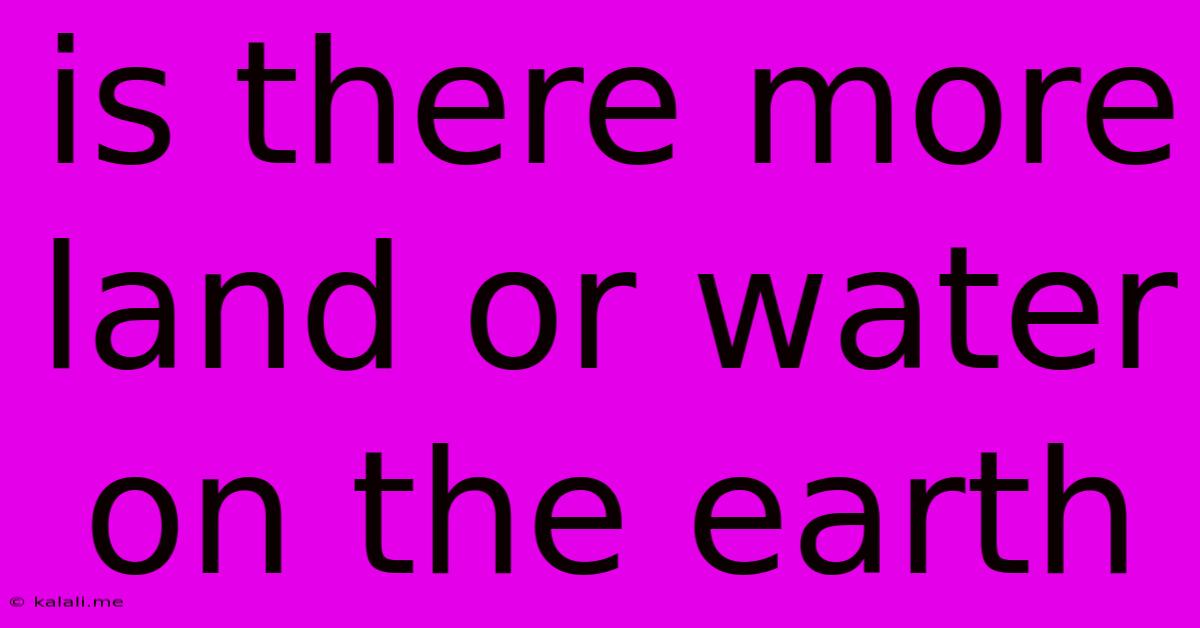Is There More Land Or Water On The Earth
Kalali
May 22, 2025 · 3 min read

Table of Contents
Is There More Land or Water on Earth? A Deep Dive into Our Planet's Composition
The question of whether there's more land or water on Earth is a deceptively simple one. While many might instinctively guess there's more land, the reality is quite different. The vast expanse of our oceans significantly outweighs the landmasses, making water the dominant feature of our planet. This article will explore this fascinating aspect of Earth's geography, delving into the percentages, the distribution of land and water, and the implications of this imbalance.
The Simple Answer: Water Wins
The straightforward answer is that Earth is predominantly covered by water. Approximately 71% of the Earth's surface is covered by water, while only about 29% is land. This means that for every three units of surface area, two are covered by oceans, seas, lakes, and rivers, while only one is land. This substantial difference highlights the dominance of the hydrosphere in shaping our planet's climate, ecosystems, and overall geology.
Understanding the Distribution of Land and Water
The distribution of land and water isn't uniform across the globe. The concentration of landmasses in the Northern Hemisphere is a key factor in this uneven distribution. The Northern Hemisphere has a significantly larger proportion of land compared to the Southern Hemisphere, which is predominantly oceanic. This difference has profound implications for weather patterns, ocean currents, and biodiversity.
- Continental Masses: The seven continents – Asia, Africa, North America, South America, Antarctica, Europe, and Australia – account for the majority of the planet’s landmass. Their varied sizes and geographical locations contribute to the diverse climates and ecosystems we see around the world.
- Ocean Basins: The five major ocean basins – Pacific, Atlantic, Indian, Arctic, and Southern – dominate the Earth's surface. These vast bodies of water play a critical role in regulating the Earth's temperature, influencing weather patterns, and supporting a wide array of marine life.
- Lakes and Rivers: While much smaller in scale than oceans, lakes and rivers are still significant components of Earth's water system. They contribute to water cycles, provide freshwater resources, and support unique ecosystems.
The Implications of Earth's Water Dominance
The fact that water covers 71% of the Earth's surface has significant implications for various aspects of our planet:
- Climate Regulation: Oceans act as massive heat sinks, absorbing and releasing heat energy, which helps to regulate global temperatures and influence weather patterns worldwide. This effect is crucial for maintaining a habitable climate.
- Biodiversity: The oceans are home to an incredible diversity of life, far exceeding the biodiversity found on land. Marine ecosystems support countless species, many of which are still undiscovered.
- Resource Management: Water is a crucial resource for human life and various industries. The management and conservation of water resources are increasingly important considerations given the growing global population and the impacts of climate change.
- Geological Processes: Water plays a vital role in shaping the Earth's geological features through erosion, weathering, and the formation of sedimentary rocks.
Conclusion: A Watery World
In conclusion, the Earth is overwhelmingly a water planet. The vast expanse of oceans significantly surpasses the area covered by land, with approximately 71% of the surface being water. Understanding this fundamental aspect of our planet's composition is crucial to comprehending various Earth processes, including climate regulation, biodiversity, and resource management. The distribution of land and water, coupled with their interaction, continues to shape our world in countless ways.
Latest Posts
Latest Posts
-
Looking Forward In Talking To You
May 23, 2025
-
Is Asian Place On Earth Have Brightest Sunshine
May 23, 2025
-
Apex Dml Currently Not Allowed
May 23, 2025
-
How To Write An Optimization Problem In Latex
May 23, 2025
-
Dnd Monster Xp Based On Cr
May 23, 2025
Related Post
Thank you for visiting our website which covers about Is There More Land Or Water On The Earth . We hope the information provided has been useful to you. Feel free to contact us if you have any questions or need further assistance. See you next time and don't miss to bookmark.